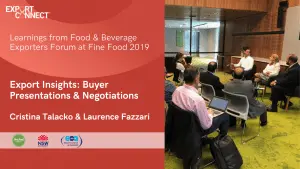Recently, Export Connect–in partnership with Investment NSW, the Department of State Development South Australia, FoodSA, Global Victoria, Melbourne’s North Food Group, the Department of State Growth Tasmania and the Brisbane Economic Development Agency–hosted an inbound mission featuring the Commercial Director from Little Farms Singapore. Following the Market Insights presentations in each city, attendees participated in a facilitated Q&A which allowed them the chance to gain some excellent first-hand insights into what’s happening in the Singapore market.
About the Buyer: Little Farms
Little Farms is one of Singapore’s premier whole food outlets, specialising in high-quality, fresh, natural, artisanal and organic products. Little Farms aims to build on its existing strong relationships with Australian food and beverage suppliers by expanding its product offering. In addition to their supermarkets, Little Farms’ in-store kitchens craft healthy meals and beverages, while their baristas serve up popular coffee and tea.
Q&A Session Insights
Question 1: On a recent market visit, I have observed some changes in consumer demographics and sentiment in Singapore. As a Singapore resident, what have you observed?
So the market is robust and vibrant. Undoubtedly, there are cost of living pressures that maybe aren’t talked about as much as in the UK or in Australia, and while still not immune to any kind of global economic shocks, Singapore’s economy seems to be more resilient than most. We’re definitely seeing a shift from spending at restaurants to retail F&B, and I think that’s a really good sign of where the customer sentiment is in terms of where they spend their money. Undoubtedly, customers are not eating out quite as much as they were two years ago and pre-COVID.
In terms of the demographic change, it’s a very transient market. There was definitely a mass exodus through COVID, but most of those spots have been refilled now. While expatriates come and go, I think that the actual absolute number will most likely always remain the same.
Question 2: What developments have you observed in the retail channel?
What we’re seeing is premiumisation from the big chain stores, and we think that that’s partly to replicate the success of Little Farms. They tend to premiumise their stores in locations close to us, in part due to the local socio-economic demographic. It is also linked to the shoppers not going to restaurants quite as much – they want a slightly more premium experience at home and so supermarkets are responding to that.
Question 3: How strong is the eCommerce channel for you?
When we talk about e-commerce, it’s about littlefarms.com and Amazon. Both represent a smaller proportion of our retail sales. And we’re okay with that. We know that our customers come into the store because they want to, they want to smell and feel the fresh produce. So we know we have that customer. The other eCommerce factor is quick commerce – think Deliveroo and Grab, which we categorise as store sales. We know that on certain days, especially if it’s raining, quick commerce sales rise.
Question 4: Running a supermarket outlet and in-store cafe provides a point of difference for consumers shopping at Little Farms. Is it good for business too?
It’s a great story for us, and it’s good economics. For example, we buy premium avocados and we always make sure that we are well stocked – Little Farms is famous for our avocados. We use the very same avocados in the restaurant too, creating volume. Similarly, if customers enjoyed their steak in the restaurant, it’s exactly the same beef sold in-store. In fact all the headline proteins on the restaurant menu are available in the retail store, including chicken, salmon, beef, and then quite a lot of the fresh produce is as well – it’s a nice story for us.
Question 5: What do you see as the categories with the best opportunity in Singapore at the moment?
Australia’s strength is dairy and meat, also the free-from and health space across categories like breakfast cereals and granolas, for example. For these trends, Australia is ahead of the market. Having attended the Naturally Good Expo yesterday, some of the key health trends included activated waters with fortified hydration and electrolytes. The US is definitely a trend-setter in the health food category, but Australia is very close behind when it comes to those trends. Vitamin gummies, healthy kids products are all very strong in Australia–these are the types of categories that we’re looking for.
Question 6: What do you look for in a supplier?
Be as organised as you can be. Very clear about who you are, what you are and what your main selling messages are. Packaging is really important as it serves as a window to the product. Make sure you’ve got your key selling messages on the packaging. We’re sourcing products from all around Australia, so be aware of how your product stacks nationally, not just in your home city.
As we have a smaller number of stores, be as flexible as you can be on minimum order quantities. Be as lean as you can be in terms of lead time, and offer promotional support. We often host farmers markets promotional events. If you can’t be in the market for these kinds of promotional events, then what other brands have done is hire someone in the Singapore market to represent them, and this can work pretty well.




